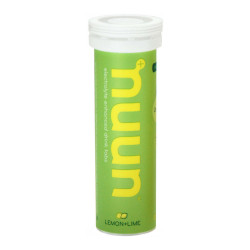 A class action lawsuit alleges that the containers of Nuun electrolyte-enhanced drink tablets are deceptive to consumers, because they contain “non-functional slack fill.”
A class action lawsuit alleges that the containers of Nuun electrolyte-enhanced drink tablets are deceptive to consumers, because they contain “non-functional slack fill.”
“Slack fill” is empty space inside a container, and the complaint alleges that unless it serves an actual purpose, or function, then that empty space violates state and federal consumer protection laws.
“[T]he size of the containers in comparison to the volume of the Products contained therein makes it appear as Plaintiffs and Class members are buying more than what is actually being sold,” the Nuun class action states.
The complaint asserts that the Nuun drink tablets come in non-transparent containers so consumers cannot see how much space is filled up by the tablets.
The class action also states that the opaque tubes “are invariably covered with brightly colored, non-transparent wrappings” and “the cover of the tubular container contains a spring mechanism” which “prevents consumers from shaking the Products and ascertaining the presence of non-functional slack-fill contained in the container.”
The Nuun drinking tablet deceptive packaging class action lawsuit contends that the Nuun containers actually have space to hold 13 tablets instead of 10, and that the containers therefore contain 24 percent of slack fill.
The complaint cites to the federal Food, Drug, and Cosmetic Act (FDCA), which provides that food is “misbranded” if “its container is so made, formed, or filled as to be misleading.”
The Nuun class action also cites to federal rules that are based on the FDCA which make it clear that nonfunctional slack fill is a violation of federal law, unless it serves a purpose.
According to the lawsuit, reasons that justify the use of slack fill include protecting the contents of a package, machine requirements for filling a package, or “unavoidable product settling during shipping.”
The class action argues that “there is no practical reason” for the slack fill in the Nuun drink tablet tubes, and they therefore violate consumer protection laws in all 50 states.
“In reliance on Defendant’s Product packaging, Plaintiffs and Class members believed that they were getting more of the Products than was actually being sold,” according to the class action lawsuit.
Plaintiff Jutamat Riedel states that she purchased two tubes of Nuun energy electrolyte-enhanced drink tablets from a sporting goods store in New York for $6.99 each. Riedel claims that she relied on the size of the tubes, and would not have paid a premium price for those Nuun products had she known they contained that much slack fill.
Riedel seeks to represent a Class of all “persons or entities in the United States who made retail purchases of Products,” which include all flavors of Nuun “active,” “energy,” “plus for nuun,” and “nuun all day” drink tablets. The class action asks for compensatory and punitive damages, restitution, and an injunction requiring Nuun to repackage its products without nonfunctional slack fill.
Riedel is represented by C.K. Lee and Anne Seelig of the Lee Litigation Group, PLLC.
The Nuun Drink Tablet Slack Fill Deceptive Packaging Class Action Lawsuit is Jutamat Riedel v. Nuun & Company Inc., Case No. 1:16-cv-04226, in the U.S. District Court for the Eastern District of New York.
UPDATE: On August 22, 2016, the Nuun Drink Tablets class action lawsuit was dismissed voluntarily by the plaintiff.
ATTORNEY ADVERTISING
Top Class Actions is a Proud Member of the American Bar Association
LEGAL INFORMATION IS NOT LEGAL ADVICE
Top Class Actions Legal Statement
©2008 – 2026 Top Class Actions® LLC
Various Trademarks held by their respective owners
This website is not intended for viewing or usage by European Union citizens.















3 thoughts onNuun Class Action Says Drink Tablets Packaging is Deceptive
UPDATE: On August 22, 2016, the Nuun Drink Tablets class action lawsuit was dismissed voluntarily by the plaintiff.
Plaintiffs have already dismissed this case.Please update ASAP.
It is already dismissed.